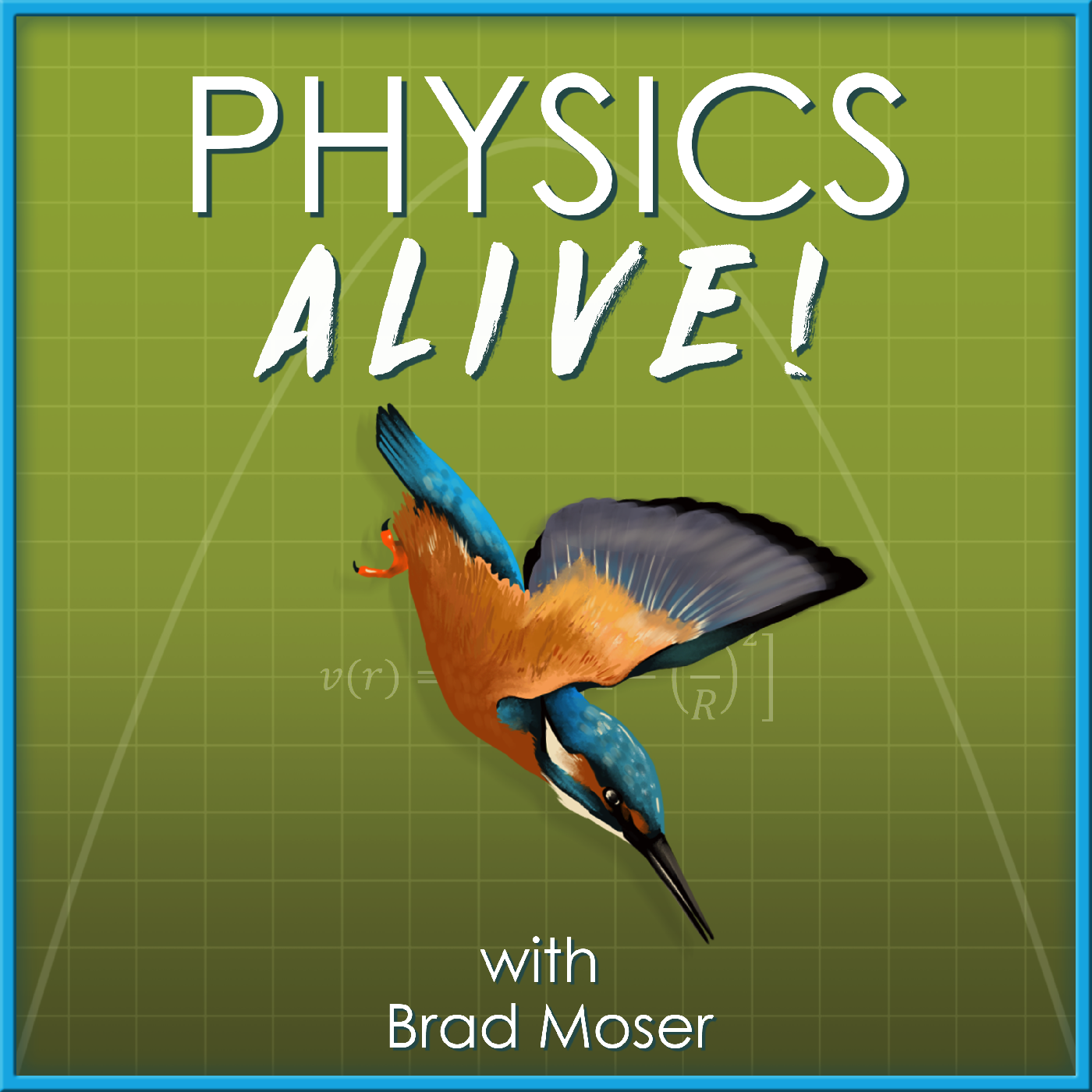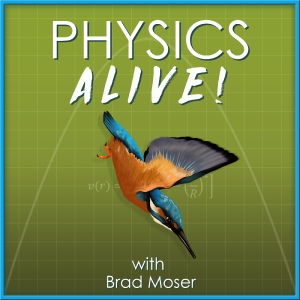
17.6K
Downloads
48
Episodes
Physics Alive is the podcast where host Brad Moser, Ph.D., sparks new life into the physics classroom. He speaks with researchers and textbook authors on the frontiers of physics education, life science and health professionals who use physics on an everyday basis, designers and engineers who learn from the natural world, teachers who employ innovative and active learning styles, and students who want the most out of their education.
Episodes

Thursday Feb 17, 2022
The Underrepresentation Curriculum
Thursday Feb 17, 2022
Thursday Feb 17, 2022
The Underrepresentation Curriculum is a flexible curriculum designed to help students critically examine scientific fields and take action for equity, inclusion and justice. I’m speaking with Angela Flynn and Moses Rifkin, two editors for the project who are also developing and using the curriculum in their classrooms. Learn all about the project, the resources you can access, and the community you can join.
Show notes at: www.physicsalive.com/underrep
To learn everything we can about the Underrepresentation Curriculum Project, I’m speaking with Angela Flynn, a teacher at the Gordon School, a nursery-8 independent school in Rhode Island, and Moses Rifkin, a science teacher at University Prep, a 6-12 independent school in Seattle, Washington. They are part of a team of 12 editors for the curriculum.
The Underrepresentation Curriculum website:
Direct links to:
Selected articles written by editors of the curriculum:
- Learning For Justice: Use the Tools of Science to Recognize Inequity in Science
- Physport: How can I talk about equity in my physics classes?
- NSTA The Science Teacher: Who Does Science?

Wednesday Feb 02, 2022
2022 AAPT Winter Meeting retrospective - Day 2
Wednesday Feb 02, 2022
Wednesday Feb 02, 2022
Dr. Anne Leak, from High Point University, Dr. Brian Lane, from the University of North Florida, and yours truly reflect and muse on Day 2 of the 2022 American Association of Physics Teachers (AAPT) Virtual Winter Meeting. The discussion includes the plenary talk by Matthew Greenhouse, physics for future careers, equity and diversity, teacher recruitment, making AAPT meetings and membership welcoming for all audiences, and our personal takeaways.
Further details, as available, are included in the show notes.

Thursday Jan 20, 2022
2022 AAPT Winter Meeting retrospective - Day 1
Thursday Jan 20, 2022
Thursday Jan 20, 2022
Dr. Brian Lane, from the University of North Florida, and I reflect and muse on Day 1 of the 2022 American Association of Physics Teachers (AAPT) Virtual Winter Meeting. The discussion includes topics from the Meeting of the Members, the plenary talk by Fred Myers, hand-picked invited and contributed sessions from the first day, and our top picks for future sessions of AAPT meetings.
Further details are included in the show notes:
www.physicsalive.com/aaptwm22_day1

Thursday Jan 13, 2022
Modeling Instruction, Teaching Teachers, and Fluid Physics with Jamie Vesenka
Thursday Jan 13, 2022
Thursday Jan 13, 2022
Jamie Vesenka is a Professor of Physics at the University of New England. He’s been using Modeling Instruction in the classroom and leading workshops for over 20 years and was an earlier pioneer in the physics for life sciences world, while also staying active in Atomic Force Microscopy research. We talk about the basics of Modeling Instruction, physics for life science, and his role as a teacher’s teacher.
Show notes: www.physicsalive.com/jamie
Modeling Instruction website:
Selected articles, posters, and presentations by Jamie Vesenka
- Inexpensive Audio Activities: Earbud-based Sound Experiments
- Implications of Modeling Method training on physics teacher development in California’s Central Valley
Jamie's teaching style is strongly influence by research-based "modeling instruction". This approach to physics learning is based on guided inquiry and Socratic questioning, compelling students to confront physics misconceptions and construct knowledge based on the scientific method. Jamie's introduction to modeling came by accident at a half day modeling physics instruction workshop. During the workshop based on the modified Atwood's Machine, Jamie had his epiphany, or "Ah-hah" moment.
He needed to know more, enrolled as the only college professor in Phase III of the NSF sponsored modeling workshops at UC Davis the following summer, and has been a modeling convert ever since. Jamie dove into physics education research recognizing the need to cover fluids in a classroom filled with future medical practitioners. He has been part of the "introductory physics in the life sciences" (IPLS) movement that focuses on conceptual physics essential to students interested in life science careers, which is pretty much most college students taking physics across the country. Jamie rejuvenates his teaching by running summer workshops in which he trains high school and middle school science and math teachers in modeling instruction almost every year since 2000.
Learn more about Jamie Vesenka and his work:

Thursday Dec 16, 2021
The Physics of Trekking Poles with Lindy Smith
Thursday Dec 16, 2021
Thursday Dec 16, 2021
Whether you climb mountains or hike on local trails through the woods, trekking poles can benefit your knees, improve your balance, and give you the confidence to navigate the natural world. Lindy Smith, a personal trainer and associate of the pole manufacturing company LEKI, shares her knowledge, experience, and stories about biomechanics, pole anatomy, and the joys of walking. With physics at the forefront, we explore the world of hiking with poles.
Show notes at:
Today's Guest:
Lindy Smith is energetic, feisty, and a trekking pole expert. She is a certified ACE Personal Trainer and certified AFAA Group Exercise Instructor who teaches in southern Florida. She is also associated with the company LEKI, manufacturers of ski, trekking, and hiking poles and gloves.
Follow her on Twitter:
Or check her out on LinkedIn:
Links:
Visit the LEKI website:
Check out the LEKI Makalu Lite CorTec poles. These are the poles that LEKI provided for my review. Honestly, they are the best poles I've ever owned: lightweight, flexible, easy to adjust, and the egg-shaped top to the grip is probably my favorite part. Such a pleasure on a steep descent.
Here are some articles I read about trekking poles before the interview. Although we did not discuss these findings in the episode, I found them really informative and interesting. If you are a student or instructor, you may find these valuable for your class:
- Article: The Science Behind Trekking Poles
- Article: The Science Behind Using Trekking Poles in Trail and Ultrarunning
- Review: Scientists Weigh in on the Great Trekking Pole Debate
- Here is the review article discussed above: Are Trekking Poles Helping or Hindering your Trekking Experience?
General findings include:
- You burn more calories
- You walk faster (or it feels that way)
- You take load off joints and muscles
- Counter arguments: Loading helps build up resistance to damage
- You balance better
- Counter arguments: Does this weaken your muscles?

Monday Nov 29, 2021
The POGIL Project with Rick Moog
Monday Nov 29, 2021
Monday Nov 29, 2021
POGIL is an acronym for Process Oriented Guided Inquiry Learning. It is a student-centered, group-learning instructional strategy and philosophy developed through research on how students learn best. Today we learn all about POGIL from Rick Moog, Professor in the Department of Chemistry at Franklin & Marshall College. He is the Executive Director of The POGIL Project and has implemented POGIL learning environments in his courses since 1994.
Check out the show notes at:
The POGIL homepage
Two articles co-authored by Dr. Moog, the origins of POGIL:
Other articles and books
- Article: The sequence of learning cycle activities in high school chemistry by Michael Abraham
- Book: POGIL - An Introduction to Process Oriented Guided Inquiry Learning for Those Who Wish to Empower Learners
More resources from the POGIL website:
Want to hear more from Rick? Listen to members of the POGIL team interview Dr. Moog on the POGIL Podcast:

Saturday Oct 23, 2021
An Interview with the Host of Physics Alive
Saturday Oct 23, 2021
Saturday Oct 23, 2021
An interview with Brad Moser, the host of Physics Alive. This episode was recorded at a live session at the 2021 Florida AAPT fall meeting. The tables have turned, as Brian Lane from Let's Code Physics takes a turn interviewing the host about the show.

Wednesday Oct 06, 2021
Labs: Stop Verifying and Start Investigating with Natasha Holmes
Wednesday Oct 06, 2021
Wednesday Oct 06, 2021
Natasha Holmes, Assistant Professor at Cornell University, studies teaching and learning in physics and other STEM courses, especially the efficacy of hands-on laboratory courses. She asks: How do we know what labs are achieving? And, what teaching methods improve outcomes? Today, she’ll share what we should stop trying to do in lab and what we might try instead.
Show notes at: www.physicsalive.com/lab
Selected articles authored and co-authored by Natasha Holmes
- 2021 – Best practice for instructional labs
- 2019 – Operationalizing the AAPT learning goals for lab
- 2018 – Intro Physics Labs: We Can Do Better
- 2018 – Value added or misattributed?
- 2013 – Teaching Assistant professional development by and for TAs
Links to other articles and resources mentioned in the episode
- Natasha’s PhysPort materials: Thinking Critically in Physics Labs
- Article on LED’s by Eugenia Etkina and Gorazd Planinsic (1st in series of 4)
- AAPT Recommendations for the Undergraduate Physics Laboratory Curriculum

Tuesday Sep 21, 2021
Teaching Expertise with Carl Wieman
Tuesday Sep 21, 2021
Tuesday Sep 21, 2021
Today I’m speaking with Carl Wieman, 2001 Nobel Laureate, Professor of Physics and Professor of the Graduate School of Education at Stanford University, and recipient of the 2020 Yidan Prize, the world’s largest prize in education. He answers the question: How do people learn to make better decisions? “They practice them, and they get feedback on that practice, and they practice some more. If you practice something very intently, your brain changes the connections to be better at doing it.” We discuss what he has uncovered in his scientific study of teaching and learning.
For today's complete show notes, go to:
Toward the end of the episode, Carl mentions a series of three papers. Each paper discusses courses that are all taught with same set of principles. Those principles are:
Practicing the thinking you want students to do, monitoring that, do timely feedback, and then letting them go back to practicing.
- Improved Learning in a Large-Enrollment Physics Class
- Transforming a fourth year modern optics course using a deliberate practice framework
- Active learning in a graduate quantum field theory course
What are some resources for new teachers or a teacher wanting to do something new?
- AAPT New Faculty Workshop is the best existing thing.
- Two books on Carl’s shelf:
- The CWSEI website. They have developed a lot of resources for instructors.

Friday Sep 17, 2021
Fluency Bias and Deliberate Practice with Louis Deslauriers
Friday Sep 17, 2021
Friday Sep 17, 2021
This is part 2 of an interview with Louis Deslauriers, the Director of Science Teaching and Learning and Senior Preceptor in Physics at Harvard University. We discuss two recent publications from his research group. In the first, he finds that students can actually feel like they are learning more while passively listening to a polished lecture than engaging in active learning. We’ll talk about that finding and what that means. In the second, we dive into his latest work on deliberate practice, and how we might take the gains from active learning in the classroom and boost them up even more by transforming homework.
Find the full show notes at:
Articles mentioned in Part 1 and Part 2 of this interview:
- Improved learning in a large-enrollment physics class
- Learning and retention of quantum concepts with different teaching methods
- Use of research-based instruction strategies: How to avoid faculty quitting
- Measuring actual learning versus feel of learning in response to being actively engaged in the classroom
- Increasing the effectiveness of active learning using deliberate practice: A homework transformation
